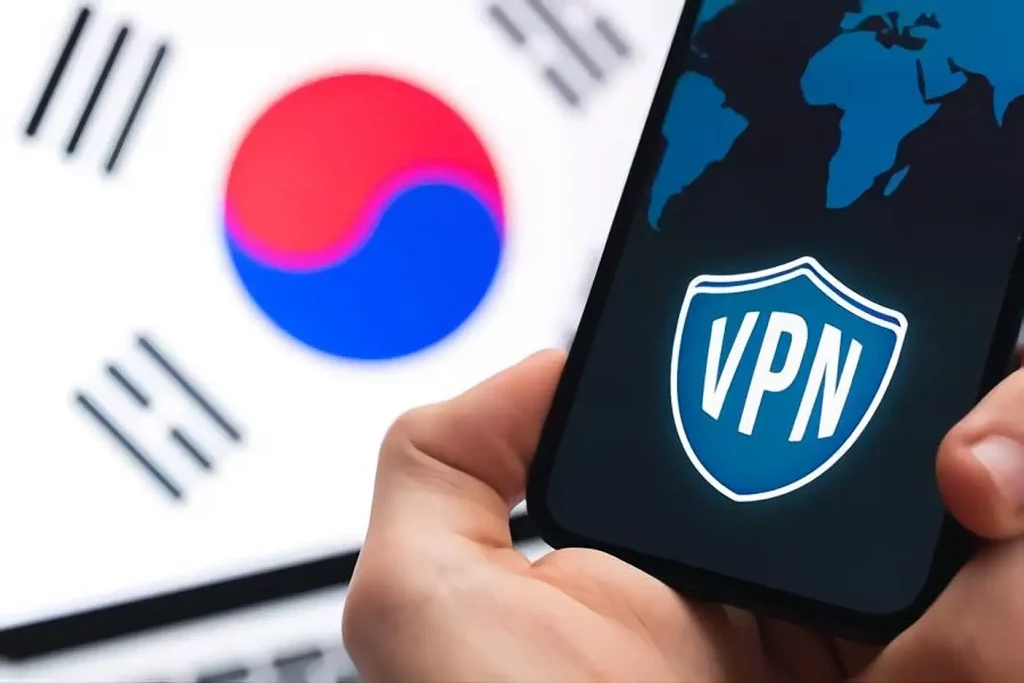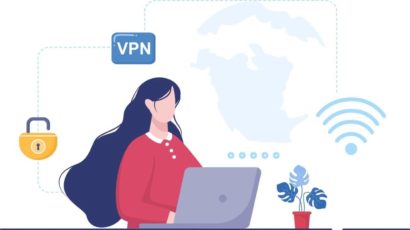Although, South Korea’s reputation for internet censorship is not as notorious as the UAE or China. However, the national culture emphasizes respect for authority and other Confucian values. Consequently, some authoritarian measures have plagued the country for decades, and they reach internet access.
So if you are using the internet from South Korea and want to guarantee your freedom as a digital citizen, you’ll need an additional tool–the VPN.
VPNs are digital platforms that perform two services for their users: total traffic encryption and IP address spoofing. The encryption scrambles the data stream that carries your digital activities so that no third party (governments included) can make sense of anything you do. The IP address masking hides your physical location, so third parties can’t tell where you are.
This second service has exciting and beneficial effects when immersed in a censored internet environment. VPNs allow you to bypass country-wide restrictions that your government imposes, to use the internet as a free user. Likewise, it also helps you retain access to services such as US Netflix, the BBC, or others while traveling away from the US or the UK.
This article tells you all about the best five VPNs to use from within South Korea if you want to retain the freedom and versatility that your internet experience affords you at home.
Top South Korean VPNs – Quick list
If you’re in a hurry and can’t manage to read the complete guide, here we shortlist our top five choices. Readers interested in learning more about each network can keep reading and find extensive information later in this guide.
- ExpressVPN: The best VPN you can use in South Korea is secure, private, and fast, and it unblocks almost every streaming service out there.
- NordVPN: With more options than almost every VPN in the industry and state-of-the-art technology, NordVPN is sure to satisfy.
- Surfshark: A young but disruptive service in the VPN world does the trick of meeting the highest standards at the lowest prices.
- Private Internet Access: As the name suggests, prioritizing privacy is a VPN with an extensive server network that keeps no logs.
- IPVanish: Good service and privacy, fast connections, ten concurrent devices.
The five best VPN vendors for South Korea in 2022 – Detailed list
The VPN market is overcrowded because it has exploded over the last few years. Every vendor claims to be the best, but only a handful can meet their promises. With so many options online, how can you choose the one that delivers your desired features, especially if you are in South Korea?
The bad news is that such an activity needs much work, time, expertise, and resources. However, we have good news too. According to the following criteria, we have already done the job and picked the best five VPN services in South Korea.
- The ability to bypass the internet restrictions unique to South Korea.
- Connections that are both fast and reliable.
- Solid encryption with some additional and useful features.
- Adhesion to a strict no-logging policy.
- App and client availability for most devices and operating systems.
Let’s start with the top VPNs for South Korea.
1. ExpressVPN

Ou top pick VPN for any online activity in or outside South Korea. It has long range of servers and offers 30-day money-back guarantee to its users.
Pros
- Stealthy security
- Includes standalone smart DNS
- 24/7 support via live chat
Cons
- Bit expensive
Very few VPNs on the internet can hold a candle to ExpressVPN. It’s been around for a long time and has kept the highest security and privacy standards, thus achieving credibility. So, for whatever reason you need a premium VPN, ExpressVPN will probably fulfill your needs in style.
The ExpressVPN server network includes more than 3,000 servers in 94 countries. They are all swift, reliable, and RAM-only, which means that all the server data is highly volatile; nothing ever gets saved into a physical hard drive. Instead, everything fades away into the digital ether once a server is rebooted (every week or two).
Thanks to its versatile network, ExpressVPN can unlock many video streaming services like Amazon Prime Video, BBC iPlayer, or Netflix.
The provider implements the industry-standard AES-256 encryption to protect user data. Moreover, its prominent security features include perfect forward secrecy and a kill switch.
Besides, the customer support at ExpressVPN includes 24/7 live chat.
Among the best things ExpressVPN has to offer is the commitment to privacy. Alongside assuring no data logs, it lets you pay anonymously with Bitcoin.
The platform includes dedicated software you can use on Windows, macOS, Android, iOS, and even Linux. You can also install it on routers, but you need to configure it manually. However, the customer support team can provide you with custom firmware for your router so that the process is painless.
The one thing about ExpressVPN that could be a disadvantage for some users is the price. It’s a little more expensive than the average VPN out there. However, the service is also better than the average. So, if you try this VPN for a couple of weeks and find it suitable for your needs, it could be worth it.
2. NordVPN

Another top VPN service suitable for any type of task you go for online in South Korea. It has water-tight security, P2P sharing mode, double VPN feature, and multiple Korean servers.
Pros
- Fast speeds
- User-friendly apps
- 24/7 live chat support
Cons
- A few unreliable servers can be slow
NordVPN is an excellent VPN provider that often tops our VPN-specific tasks list. It also turned out to be the best VPN that guarantees your privacy and freedom in South Korea.
Its 5,000+ server network is one of the largest in the industry, including 60 countries. Ten of those servers are in South Korea, no less. The speeds are impressive, and the links are reliable, making it an ideal tool for HD video streams from any service. Hence, the VPN unlocks many video streaming services, such as Sling TV, Hulu, and Netflix.
The server network includes specialized servers optimized for BitTorrent and other P2P networks. It also ensures DDoS protection and supports internet freedom even in those countries with the most oppressive internet censorship.
NordVPN will also give you many additional security features that significantly improve your privacy, safety, and anonymity. The network can prevent IP address leaks of all types (DNS, IPv6, WebRTC, and port-forwarding). Your subscription includes an ad-blocker and malware scanner. You can use multi-hop connections (routing your traffic through two servers in the network) and use Tor over VPN.
NordVPN honors a strict no-logs policy. Therefore, they do not collect any information that can leave your trace. Moreover, if you want to be a perfectly anonymous NordVPN user, you can subscribe with a disposable email address and pay with Bitcoin.
The vendor has macOS, Windows, Android, iOS, and Linux apps. It supports router installation too, but you have to do everything manually.
3. Surfshark

An affordable option with premium features to go for South Korea. It comes with extra features in low-budget.
Pros
- Secured with military grade encryption
- Fast speed
- User-friendly interface
Cons
- Speed lags with distant servers
While ExpressVPN is the biggest name in VPN-land, and NordVPN is getting larger every day, Surfshark is a newcomer. However, within a few years, Surfshark has turned the market upside down by offering a premium service comparable to the leading VPNs at a fraction of the price. But don’t be confused. It is not a cheap service. On the contrary, it’s a costly service offered at a meager price because that’s the business model that Surfshark wants.
Surfshark has servers in more than 65 countries, with a total number of nodes exceeding 3,200. Your bandwidth is uncapped, and the links are both fast and reliable. The unlocking capabilities of Surfshark are almost as good as ExpressVPN‘s. Every server is suitable for P2P activities. A remarkable feature of Surfshark is the number of devices you can connect to the network with a single account –there’s no limit; you can have as many devices connected to your VPN as you want.
The security in Surfshark is also top-notch. Encryption is AES 256-bit, as we expect from any good provider. The local software (your app) has a kill switch, and the network can handle every type of IP leak. The “NoBorders” feature enables you to browse the web as if you were back at home (or even better) in China, Saudi Arabia, or, yes, South Korea.
The vendor’s privacy policy is immaculate as they keep no logs of personally identifiable information. In addition, its customer support team is available for you through the 24/7 live chat feature. And the crypto enthusiasts can pay with Bitcoin, Ether, or XRP.
You can use Surfshark on iOS, Android, Windows, macOS, Linux, and some supported routers.
4. Private Internet Access (PIA)

A well-maintained VPN with extensive server network offering impressive, reliable, and fast-speed services anywhere in the world, South Korea is no exception.
Pros
- Multiple US servers
- Watertight security features
- User-friendly interface
Cons
- Inconsistent geo-blocking capabilities
Private Internet Access (PIA) is a very special VPN in many respects. The server network, for a start, is enormous, probably the largest in the industry. It has approximately more than 26,650 servers in 84 countries.
Security is also excellent with PIA. The encryption is AES 256, the speeds are fast, and the connections are stable.
But perhaps privacy is the most remarkable feature of PIA. Because it’s based in a generally hostile jurisdiction to privacy (the United States), some users have doubts about trusting PIA. But in fact, very few VPNs have had their commitment to privacy put to the test. PIA has.
During two legal cases in 2015 and 2017, the government requested the network’s logs as relevant to a criminal investigation. Although PIA didn’t refuse to cooperate with the authorities, it had nothing to hand over because it had no saved logs. That is how you know for sure that a no-logs policy is meaningful.
PIA allows for up to ten simultaneous connections with a single account. Besides, it has excellent customer service with live chat online 24/7.
Another exciting thing about PIA is that all its apps are open-source projects. You don’t need to be a geek to appreciate this. The open-source nature of those projects guarantees that the code is transparent and open to audit by any third party. It adds a layer of credibility that no other provider has.
Last but not least, this is a very user-friendly VPN. So, the users new to the VPN world will have a smoother experience entering this universe for the first time.
5. IPVanish

Decent VPN service that works good in South Korea. It gives unlimites connection on one subscription also it offers 30-day money-back guarantee.
Pros
- Allows unlimited connections with one subsription
- Affordable pricing
- Easy to use apps
Cons
- Struggles to unblock some sites
IPVanish is another premium VPN service with some unique characteristics. The apps it puts forward are very lightweight, and it allows unlimited concurrent connections. Therefore, this service is suitable if you want or need to protect many devices simultaneously with minimum effort.
The network connections are fast enough and solid enough to support HD video streams without any buffering or stuttering. The network is not as extensive as the other services –it spans about 2,000 servers in 75+ locations. But size isn’t everything in VPNs. The servers have all the power and bandwidth you need as a user. Hence, its smaller network size does not impact your user experience noticeably. The IPVanish VPN server network suffices to allow South Korean users access to a wide array of online content otherwise unavailable.
IPVanish does traffic encryption with the standard AES 256-bit. Leak protection is adequate, and both mobile and desktop software include:
- A kill switch.
- A LAN traffic blocker.
- Traffic obfuscation through OpenVPN.
- The option to switch IP addresses at fixed periods.
The privacy policy is on par with the best ones online, as the servers keep no logs. And customer service is good, featuring a live chat option that is online 24/7.
The apps come in the usual flavors: Windows, macOS, Android, iOS, Amazon Fire TV, and Firestick. In addition, some Linux systems and routers also admit IPVanish.
Methodology: How we figured out the best VPN provider for South Korea-based users
Earlier, we mentioned how the general public’s concern with internet privacy, security, and online anonymity had grown dramatically over the last few years–Julian Assange and Edward Snowden pushed this trend. Then, the ideal digital privacy tool (the VPN) market grew in the same proportion, and now the market is overcrowded with options.
But not all VPNs are as good as their ads claim. And, since we are looking for the best services to use while in South Korea, that must be considered. That is because a VPN that could give you an excellent service in, say, Mexico won’t be as good in South Korea, for whatever reason.
Thus, we did our homework very carefully to ensure that the VPNs we recommend are the best options you can have in South Korea. In addition, we evaluated the services’ features and functionality as they will be available to you when you’re there.
So we ended up writing down a list of features that are not negotiable. A good VPN service for users in South Korea must include the following things.
Server availability
We’re always saying that size isn’t everything. Nevertheless, it would be best to have plenty of options regarding servers not in Korea but close enough to keep the speeds high.
Connection speeds and bandwidth
Every VPN will tell you nobody’s faster. Most of them, of course, are not. So we performed the tests to find out which are the fastest ones indeed.
Unblocking ability
Geoblocking in South Korea doesn’t get as much press as in China or the UAE. Nevertheless, it’s a harsh reality. As of 2020, more than 160.000 websites worldwide were unavailable to South Korean users because of the domestic geoblocking policies. If you’re going to use a VPN from South Korea, you want to gain access to all those blocked sites. So, we mentioned the ones that will give you the best content range.
Security
When you’re in a country with a strict censorship digital policy, you need to be able to stay under the government’s radar. In this regard, encryption is irrelevant because most VPN providers conform to the AES 256-bit standard. However, IP leaks are another story altogether. So we picked services whose security measures guarantee that nobody will find your actual IP address by an unhappy accident.
Privacy
South Korean law considers online defamation a criminal activity that can land you in jail –and this goes even if you’re telling a verifiable truth. That is why a VPN’s ability to keep you anonymous is critical. In VPNs, privacy starts with a no-logs policy, preferably one tested in real life. Additionally, they are very welcome if there are anonymous payment options, stealth mode, obfuscated traffic, multi-hop connections, and other privacy-enhancing features.
Friendliness
While VPNs started as toys for the geekiest among us, the new digital reality demands for them to be accessible to every type of user. You should be able to get started on any of our selected VPNs without reading any guide (other than this article). And if you run into any doubts or problems, the customer support in the VPN should be able to help you quickly and effectively.
Pricing
A good service should cost you something, but it also has to be fair. Surfshark’s monthly fee is meager. The rest are reasonably priced. Even ExpressVPN, the priciest vendor on our list, has reasonable prices, especially if you consider it the best VPN.
How to get a South Korean IP address from abroad

There are reasons for which you could want to have a South Korean IP address when you’re outside the country. For example, maybe you want to see the shows on Netflix Korea or YouTube Korea. Or other services will not serve you unless you reach them using a domestic IP address (some banks, for instance).
The good news is that if a VPN can get you virtually out of South Korea, it can also get you virtually inside. So here’s what you do:
- Pick the VPN service you liked best from our list. ExpressVPN is the way to go if you ask us, but the other four will also work. Subscribe or sign up for the free trial promotion.
- Find the VPN service apps, download them, and install them.
- Open the app and log in.
- Now pick a server from your VPN network. For example, since we want a South Korean IP address, choose a server based in that country.
- That’s it! You can use an IP checking tool to ensure that, as far as the internet is concerned, you’re in South Korea now.
Will a free VPN help me bypass South Korean internet censorship?
There is no general answer to this question. It depends on the kind of activities you intend to perform from South Korea and the specific free VPN you have in mind. However, we always advise our readers to avoid free VPNs and never touch them with a six-foot pole.
There are plenty of reasons for any privacy-savvy user to keep away from free VPNs. They go from sheer impaired functionality to authentic privacy and security hazards.
Performance issues
Let’s start with the most fundamental reason not to use free VPNs: they’re not very good. Free VPN server networks tend to be small, but they attract a lot of users. That results in overworked servers. Establishing a link is hard, and it can take several minutes.
And once you get one, you can lose it quickly. Then, once you’re connected, you’ll find that because your bandwidth and data transfers are capped, there will be very little that you can do –if anything, because, on top of everything, free VPNs are not good bypassing geolocation restrictions. So the first reason not to use free VPNs from South Korea is, quite simply, that they won’t work.
Poor security
A 2016 study found that about 40% of the free VPNs on the internet attempted to install malware on their users’ devices. But, almost a fifth of them didn’t encrypt any traffic (which means they shouldn’t claim to be VPNs at all), and more than 80% were prone to IP address leaking, especially from IPv6 problems.
So if and when you try to use a free VPN in South Korea (or elsewhere), you have a considerable probability of making everything worse for you. So, again, you’re not getting extra protection but an additional liability.
Risk to user privacy
Free VPNs are not charitable organizations but businesses that are supposed to turn a profit. And how do they do that if they’re not charging you for the service? The typical business model in this market consists of their servers keeping detailed logs of user activities. Then those logs are sold to advertisers and other data mining businesses. So free VPNs make a buck by turning your privacy into a commodity, yet another reason you can stay away from them.
So yes, free VPNs are a tempting proposition. They charge you nothing, and they claim to be as good as the best premium services. But, unfortunately, the truth is that they provide awful services that put your privacy and security in peril on top of everything.
Unblocking the broader internet from South Korea
South Korean internet users have to live with many restrictions on foreign websites. However, you can restore your online freedom with a VPN, even if you’ve never tried that before.
Here is how you can unblock the wider internet and see it as it looks from outside South Korea:
- Your first step is to pick a premium VPN service. While ExpressVPN is the best, all five options presented above will do.
- Install your VPN provider’s software into the device you intend to use with it.
- Launch the app. Provide your user credentials to log in.
- Pick a server from the network. The country you choose matters. For instance, if you want to use the internet as if you were in the UK, you need to pick a server from that region.
- Now you will have the same access to the whole internet as you would if you should be located in your server’s country.
So what is the deal with the internet in South Korea, anyway?
The internet experience for South Korean users differs from the world’s average in two ways: there is some specific kind of content that is blocked. And internet users must identify themselves if they publish anything visible to uncensored websites or if they’re going to browse around webpages that are not suitable for younger users. However, the validity of the identification process is not left to the users’ conscience. On the contrary, identities are verified using the Citizen’s Reference number or a copy of the user’s passport.
So what is the kind of content that makes the South Korean government so unhappy? Well, these are the four main types of things that get censored:
- Websites and comments that are pro-North-Korean.
- Political opinions challenging the mainstream, mainly as represented by the President’s views.
- Gambling.
- Pornography.
These restrictions are nowhere near as extensive as those in China. But once you’re there, you’ll find they reach far enough and are not exempt from an element of dictatorial imposition. The “cyber defamation” domestic law doesn’t help matters either.
Also, the legal notion of defamation in South Korea is tweaked to be a helpful tool against anti-establishment sentiment, critical discussion, or dissent from the government. In most of the world, defamation implies using false statements to attack somebody. However, in South Korea, any information that hurts an individual’s reputation is deemed defamatory, even if that information is accurate.
It is not a legal detail only. Do not forget that in many countries of the far East, respect for authority is almost sacred. So if you’re a visitor, mind your opinions.
And why else would I want to have a VPN while in South Korea?
If you’re not used to the particular flavor that the internet has in South Korea, then you’ll have plenty of additional reasons to have a VPN while you’re there.
For instance, if you have to do some digital banking, your bank will likely have some alarms triggered if you try to connect from South Korea–in fact, many banks will not even allow you to log in. So instead, you can use a VPN to connect to your bank’s system via your country’s VPN server to avoid all the hassle.
Also, are you used to including gaming or gambling sites in your entertainment diet? Well, the South Korean menu could starve you in that case because you can’t access that kind of website from the open internet there. And since we’re on the entertainment issue, if you want to enjoy the catalog of Netflix (and other video streaming services) that you usually have, you have to connect to them from a server in your country.
Conclusion
This article has shown you why you need a premium VPN service in South Korea, how to get a VPN connection to bypass local restrictions, and which are the best VPNs you can employ for that purpose.
VPNs are an especially relevant service when you are in a country that places meaningful restrictions on its internet access. However, we believe that every internet user should be using a VPN at all times, whether in a country with a hostile digital environment or in a very friendly one. That’s because digital reality is not now what it used to be. Threats to your anonymity, privacy, and digital security are everywhere, and they have nothing to do with South Korea.
Edward Snowden forced privacy awareness into the mainstream in this day and age. Nobody can just keep going through life as if it never happened. Your privacy matters, and so does your security. Suppose you think that the few bucks that a premium VPN will cost you think again. And this is especially true in South Korea, where the wrong political opinion expressed freely can complicate your life beyond measure.
Yes, we wish that every one of our readers would get a VPN just as soon as they finish reading it. Why? Because the goal of our work is to help them keep as safe as possible on the internet. And in the current digital environment, that’s impossible to do without an excellent VPN at your disposal.
FAQs
Yes, you can. Pick a VPN server located in South Korea, which will do the trick. However, avoid using a Smart DNS or a proxy server as they won’t encrypt your traffic. Use a VPN always.
There are no laws proscribing VPNs in South Korea as we write this.
The status of gambling in South Korea can be confusing to westerners. There are plenty of brick-and-mortar establishments where you can place bets, but no online casino exists within the country. Furthermore, according to the law of the land, it’s a crime to gamble to “gain property,” but it’s okay if it’s for “momentary pleasure” only.
The catalog available for South Korean users on Netflix is comprehensive. It includes the platforms’ original content as well as many Korean shows.
You don’t need a VPN to play PUBG in South Korea. However, you need to find and install the region-specific version of the app because the generic one won’t work in Japan or South Korea.
No, not every VPN in the market includes servers based in South Korea. However, many do have them. South Korea is the country in the far East in the VPN world with the more significant number of available servers after Japan.
If your device is Android, iOS, Windows, macOS, and even Linux, there are several VPN vendors whose software will work perfectly with it. Additionally, most of the VPNs in our list can be deployed into a router directly, and at least one of them will also support Amazon devices.






